As Russian President Announces a Three-Day Truce for May 9 Celebrations, Attacks Continue Across Ukraine While North Korea Officially Acknowledges Troop Deployments
Summary of the Day – April 28, 2025
The diplomatic landscape shifted dramatically today as Vladimir Putin announced a three-day “humanitarian truce” for Victory Day celebrations, a move Ukrainian officials immediately denounced as manipulation designed to secure quiet for Russian military parades rather than a genuine peace overture. Meanwhile, a major admission came simultaneously from Moscow and Pyongyang, as both countries officially acknowledged North Korean troops fighting alongside Russian forces in Kursk Oblast. On the battlefield, Russian forces advanced in multiple sectors while Ukrainian drones struck a key electronics factory in Bryansk producing missile system components. The human toll of the conflict was laid bare at a Kyiv crematorium, where hundreds gathered to mourn a family killed in a recent missile strike. As the Czech Republic announced delivery of 400,000 more artillery shells to Ukraine, German Defense Minister Boris Pistorius rejected any peace deal requiring major territorial concessions.
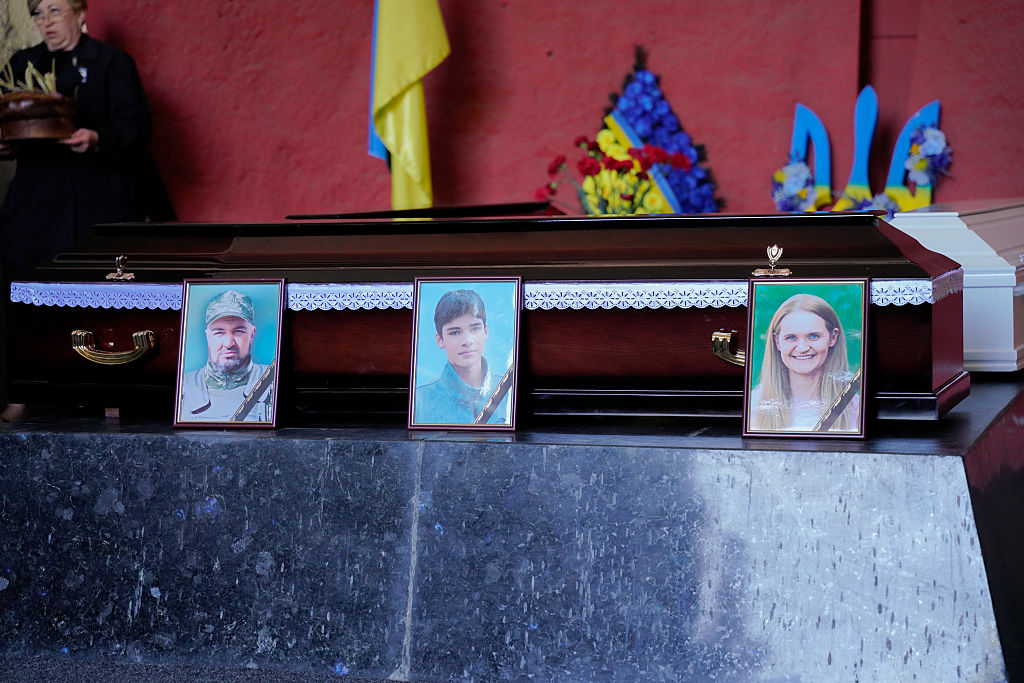 /
/
Photos of the deceased Khudei family — father Oleh, son Danylo, and mother Viktoriia — stand near the coffin during the farewell ceremony in Kyiv. Seventeen-year-old Danylo Khudei and his parents were killed in the Russian missile strike on the Sviatoshynskyi district during the night of April 24. (Ihor Kuznietsov/Novyny Live/Global Images Ukraine via Getty Images)
A Ceasefire in Name Only: Putin Announces Victory Day Truce
Russian President Vladimir Putin announced a temporary ceasefire from midnight on May 8 until midnight on May 11 to mark the 80th anniversary of the end of World War II in Europe. The Kremlin statement claimed Russia would halt all military operations during this period and “believes that the Ukrainian side should follow this example.”
The announcement, however, came amid continuing Russian strikes across Ukrainian regions, which killed at least six civilians and injured at least 13 during the past day, according to regional authorities. In Donetsk Oblast alone, Russian attacks killed five people and injured six, with three killed and five injured in an air strike against Kostiantynivka that damaged 21 houses.
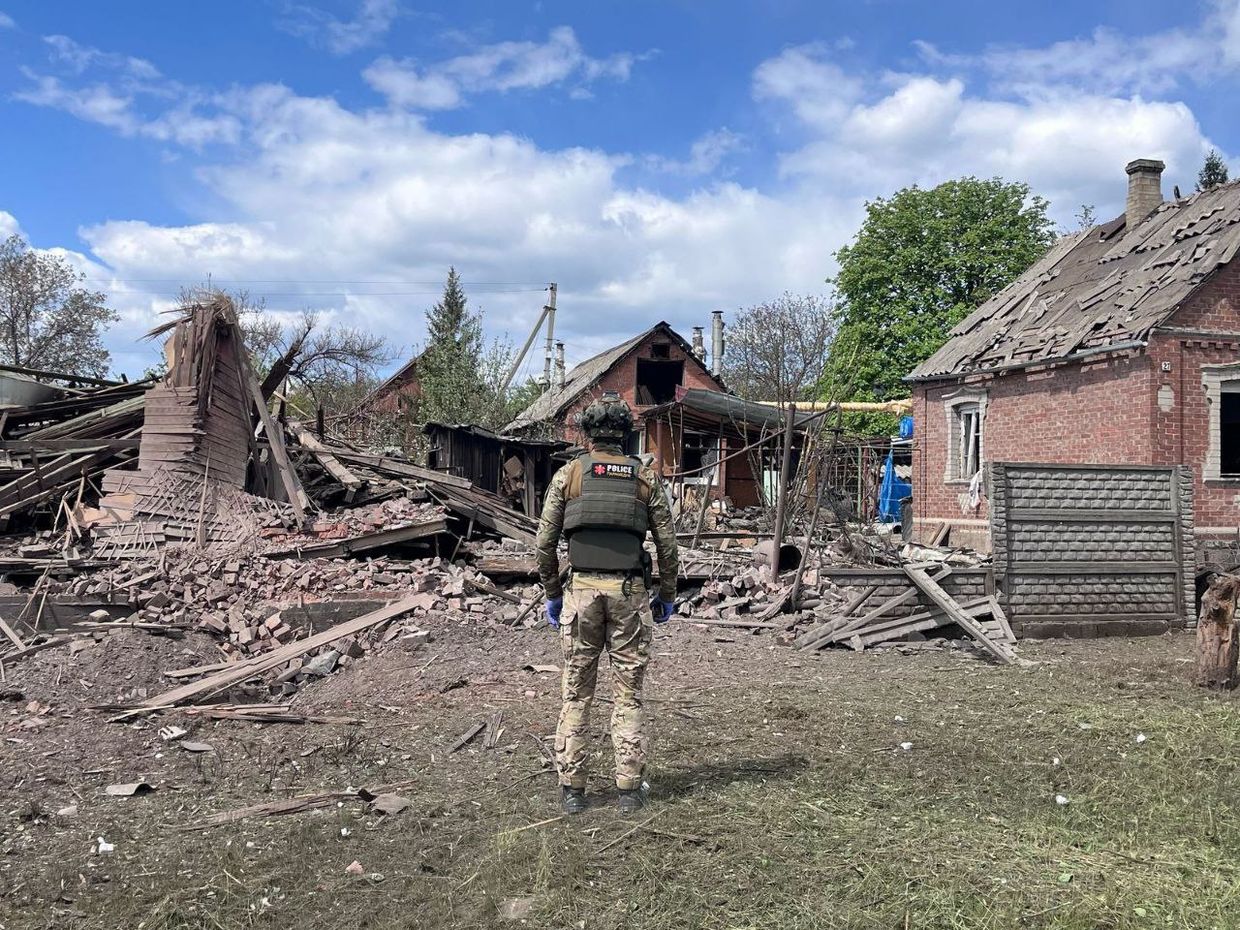
The aftermath of a Russian attack against Kostiantynivka, Donetsk Oblast, Ukraine. (Governor Vadym Filashkin)
“This is another attempt at manipulation,” wrote Ukrainian President Volodymyr Zelensky on social media. “For some reason, everyone is supposed to wait until May 8 before ceasing fire—just to provide Putin with silence for his parade.”
Ukrainian Foreign Minister Andriy Sybiha directly questioned the delay: “If Russia truly wants peace, it must cease fire immediately. Why wait until May 8th?”
The North Korean Connection: Pyongyang Admits Troops Fighting in Ukraine
After months of denials, both Moscow and Pyongyang finally acknowledged that North Korean troops are fighting alongside Russian forces in Kursk Oblast. Russian state news agency TASS released video footage showing North Korean soldiers in Russian military gear training with rifles and rocket-propelled grenade launchers.
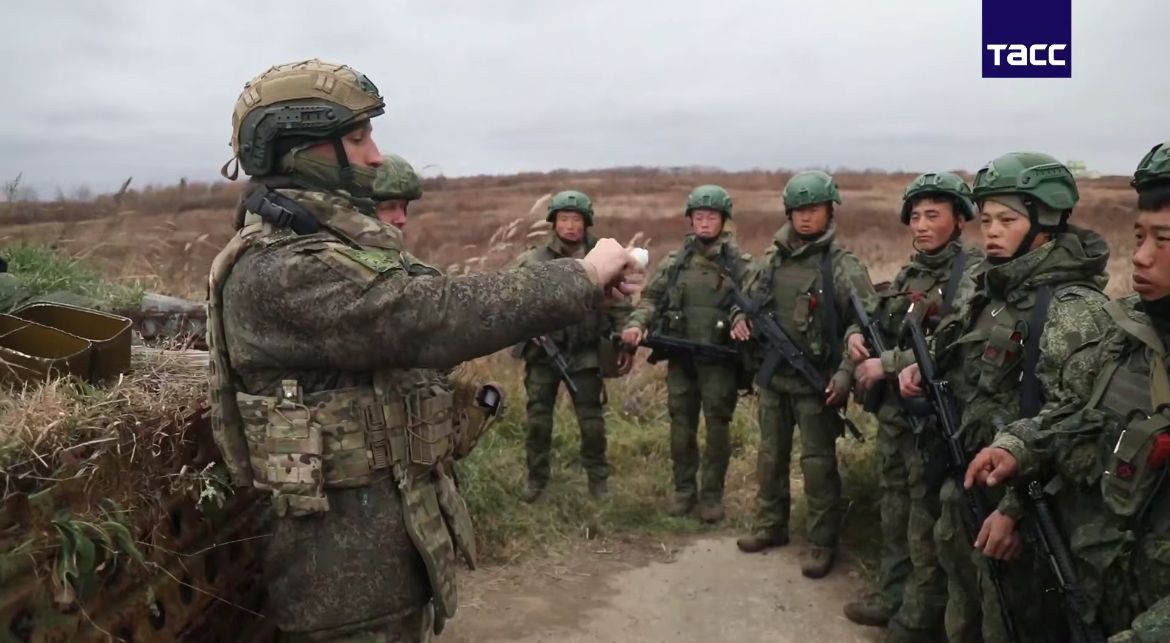
A group of North Korean soldiers, dressed in Russian military gear and equipped with rifles, are gathered around a Russian instructor in a field. Footage released. (Screenshot from a video released by the Russian state news agency TASS)
Putin personally thanked North Korean leader Kim Jong Un for the military assistance, stating that “the Russian people will never forget the achievement of the fighters of the Korean special forces.” The Kremlin also pledged to offer North Korea “reciprocal active military support” in the future.
North Korea’s Central Military Commission confirmed that Kim had ordered the deployment, describing it as a “sacred mission” that solidified the “friendship and solidarity” between Russians and North Koreans. Ukrainian officials estimate that North Korea has deployed around 11,000 troops to Russia, with an additional 3,000 reinforcements sent to offset battlefield losses.
The U.S. and South Korea denounced the deployment, with Seoul calling it an “admission of criminal act” that violates international norms. China refused to comment, with Foreign Ministry spokesperson Guo Jiakun telling journalists that “interaction between Pyongyang and Moscow, including military cooperation, is their own business.”
The Children’s Exodus: Russia Plans Mass Deportation of Ukrainian Children
Russian First Deputy Education Minister Alexander Bugayev stated that about 53,000 children from occupied Ukraine will “spend their summer holidays” in children’s camps throughout occupied Ukraine and the Russian Federation.
Donetsk People’s Republic head Denis Pushilin noted that his administration will send 2,500 children to camps in occupied Crimea, Krasnodar Krai, and occupied Zaporizhia Oblast. Additionally, teenagers aged 14 to 17 will continue to be sent to Russia through the “University Shifts” program, with 13,000 children expected to “rest” in various Russian regions.
The Yale Humanitarian Research Lab previously identified 43 facilities involved in the removal, deportation, and re-education of Ukrainian children. These summer camps serve as re-education centers that aim to indoctrinate Ukrainian children through academic instruction, military training, and military-patriotic education.
Germany’s Red Line: Pistorius Rejects Major Territorial Concessions
German Defense Minister Boris Pistorius firmly rejected proposals that would require Ukraine to cede significant territory to Russia in exchange for peace. “Ukraine could have done that alone, just a year ago, through a surrender,” Pistorius said in an interview with Tagesschau.
While acknowledging that some territorial concessions might be necessary for a lasting peace agreement, Pistorius emphasized that “these will certainly not go as far as they do in the latest proposal by the American president.”
Pistorius also committed to continuing Germany’s military support for Ukraine even if the United States discontinued its assistance, emphasizing that European security depends on preventing a Russian victory: “This is not just about solidarity with Ukraine, it is about our security and our peace in Europe.”
The Northern Fortification: Russia Expands Military Infrastructure Near Finland
Western military and intelligence officials reported that Russia is expanding its military infrastructure along its border with Finland. According to the Wall Street Journal, these efforts include expanding military bases near Petrozavodsk (around 160 kilometers east of Finland), upgrading railway lines, and constructing new barracks and training grounds.
The Kremlin plans to create a new army headquarters near Petrozavodsk in the next several years that could potentially command tens of thousands of troops, and form new divisions based on existing brigades in the Leningrad Military District. A senior Finnish military official stated that Russia is sending “almost none” of its newly produced tanks to the frontline in Ukraine but is stockpiling them for “later use.”
NATO officials have increasingly warned that Moscow could launch aggression against alliance members in the coming years, with Finland—which shares a 1,300-kilometer border with Russia—reporting increased hybrid operations since joining NATO in 2023.
The Ammunition Lifeline: Czech Initiative Delivers 400,000 More Shells
The Czech-led ammunition initiative had delivered another 400,000 high-caliber rounds to Ukraine by the end of April, Czech Defense Minister Jana Černochová said. The initiative, which supplied 1.5 million rounds in 2024, has secured funding to continue deliveries through fall 2025.
Backed by contributions from Canada, Norway, the Netherlands, Denmark, and other countries, the initiative has significantly reduced Russia’s artillery advantage from a 10-to-1 ratio to approximately 2-to-1, according to Czech Foreign Minister Jan Lipavský.
“We will supply as much ammunition as we can find around the world,” Černochová said. “And we still have enough resources; they are now around an additional 1.5 million rounds.”
Tanks on Hold: Australia’s Abrams Delivery to Ukraine Delayed
A fleet of decommissioned U.S.-made Abrams tanks that Australia promised to Kyiv has not yet been delivered, in part due to resistance from Washington, the Australian Broadcasting Corporation reported, citing unnamed defense officials.
Australia pledged to send Kyiv 49 “soon-to-be-retired” M1A1 Abrams tanks as part of a broader military aid package in October 2024. However, the tanks are still sitting in Australia, as the U.S. has to grant formal permission before the vehicles can be delivered to another country.
“We are starting to doubt if the Ukrainians actually want these vehicles — the tank roof is the weakest point of the Abrams and this is a drone war,” one defense official told ABC. Despite these concerns, the Australian Defense Ministry stated that the promised tanks are “on target” to reach Ukraine in 2025.
The Silicon Strike: Ukrainian Drones Target Key Russian Electronics Factory
Ukrainian forces struck the “Kremniy El” microelectronics plant in Bryansk City on the night of April 27 to 28, according to Andrii Kovalenko, head of Ukraine’s Center for Countering Disinformation. The facility produces components for missile systems such as the Iskander, as well as for Pantsir air defense systems, radars, electronic warfare systems, and drones.
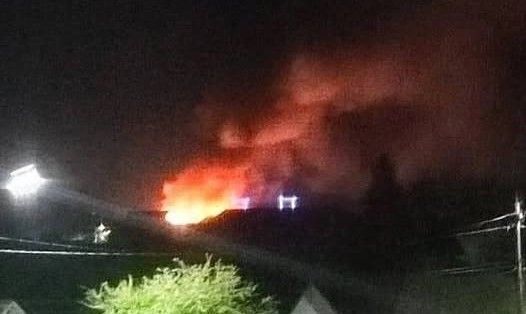
Footage that purports to show the aftermath of a drone attack against Bryansk, Russia, overnight. (Astra/Telegram)
Geolocated footage published on April 27 showed an explosion near the plant, while Bryansk Oblast Governor Alexander Bogomaz claimed that Russian forces shot down 102 drones over the oblast. The Russian Ministry of Defense claimed that Russian forces shot down a total of 115 Ukrainian drones overnight: 102 over Bryansk region, 9 over occupied Crimea, 2 over Kursk region, 1 over Belgorod region, and 1 over the Black Sea.
The Kursk Contradiction: Russia Claims Victory While Fighting Continues
Russian officials continued to claim that their forces have regained full control of Kursk Oblast from Ukrainian forces, while Russian military bloggers reported that Ukrainian forces maintain limited positions in border areas south of Sudzha, including in Gornal and near Oleshnya.
The acting commander of Russia’s 810th Brigade told Putin that the remaining Ukrainian troops in the region would “soon be destroyed,” contradicting earlier Kremlin statements that Russian forces had fully recaptured the area. President Zelensky insisted that fighting in Kursk Oblast is ongoing.
Ukrainian military observer Yuriy Butusov stated that Russia has redeployed elements of multiple motorized rifle brigades and naval infantry units to respond to Ukrainian incursions into northwesternmost Belgorod Oblast, indicating continuing cross-border operations.
The War Crime Confession: Russian Commander Describes Perfidy Tactics
The Russian Ministry of Defense’s Main Military-Political Directorate Deputy Head and Akhmat Spetsnaz Commander, Major General Apti Alaudinov, described deception tactics that may constitute perfidy—a war crime under the Geneva Convention. Alaudinov claimed that Russian forces recently used blue electrical tape identification marks during an operation in Kursk Oblast, knowing that Ukrainian forces also use blue tape for identification.
“We were supposed to have blue tape for the first 24 hours of the operation and then change it to red [tape],” Alaudinov told TASS, explaining that the tactic was designed to “prevent the Ukrainian military from understanding what was happening” and to make them “think that their own units were advancing.”
The Geneva Convention defines perfidy as “acts inviting the confidence of an adversary to lead him to believe that he is entitled to, or is obliged to accord, protection under the rules of international law applicable in armed conflict, with intent to betray that confidence.”
The Battlefield Advance: Russian Forces Gain Ground in Multiple Sectors
Russian forces made confirmed advances in several sectors of the front line. In northern Sumy Oblast, Russian troops advanced west of Loknya and likely seized fields near Basivka and southeast of Zhuravka. Ukraine’s Border Service reported that Russian forces are deploying small infantry groups near the international border, occasionally using all-terrain vehicles but not armored vehicles.
In the Kupyansk direction, Russian forces seized southern Kamyanka near the international border and advanced on the settlement’s eastern outskirts. A Ukrainian brigade spokesperson reported that Russian forces have abandoned mechanized assaults in favor of daily infantry attacks in small groups.
Russian forces also advanced on the eastern outskirts of Hryhorivka northeast of Siversk, and in the Toretsk direction, they reached a dam north of the city. Geolocated footage published on April 27 indicated that Russian forces recently advanced northeast and northwest of Nadiivka, east of Novopavlivka.
The Digital Battlefield: Ukraine Launches Military Tech Marketplace
Ukraine launched Brave1 Market, an online marketplace for military technologies, Digital Transformation Minister Mykhailo Fedorov announced during the Defense Tech Era conference. Military units will be able to purchase equipment and weapons using “ePoints” awarded for confirming the destruction of Russian equipment with drone footage.
“Brave1 Market will become the Amazon for the military, enabling units to buy the needed technologies on the front lines right now,” Fedorov said. Over 1,000 items are currently listed, including drones, unmanned ground vehicles, electronic warfare systems, and AI-based technologies.
Deputy Defense Minister Valerii Churkin revealed that more than 95% of the drones used by Ukrainian forces at the front line are now made in Ukraine. In 2024, Ukraine’s Defense Ministry authorized more than 330 new models of domestically produced unmanned systems, compared to only 75 a year earlier.
The Drone Revolution: Zaluzhny Says UAVs Have Transformed Modern Warfare
Ukraine’s ambassador to the UK, former Commander-in-Chief of the Armed Forces of Ukraine, Valery Zaluzhny, said that the war in Ukraine has radically transformed the nature of modern combat — with drones becoming the decisive force in warfare, rendering heavy weapons obsolete.
Addressing the Ukraine-United Kingdom Defense Technology Forum in London, Zaluzhny said: “The war in Ukraine has become the driving force behind many forces that have led to a change in the world order. This change has already taken place. And it does not depend on whether modern politicians want to see it or not.”
According to Zaluzhny, warfare has entered a new phase, where traditional tactics and weapons are no longer viable. “Thanks to unmanned systems and digital technologies, the traditional and familiar types of weapons that have determined the nature of war for decades have become history. They are no longer there.”
“Armored vehicles, which have been the basis of offensive operations since 1915, have become defenseless against cheap drones, and therefore their use in other types of combat is impossible today,” he stated, adding that high-precision weapons that used GPS positioning have lost their effectiveness due to the development of electronic warfare.
The Drone-Guided Freedom: Border Guards Free Captives Using UAVs
Ukrainian border guards freed three Ukrainian servicemen from Russian captivity using drones and precision drone drops, the State Border Guard Service reported. The video shows reconnaissance drone operators from the border guards spotting a group of Russian soldiers escorting three captured Ukrainian servicemen.
The footage shows a drone dropping explosives, striking one Russian soldier, who falls to the ground, apparently wounded. Further explosions cause the remaining Russian soldiers to scatter in different directions. The three Ukrainian prisoners are then seen following a drone, which leads them safely back toward Ukrainian positions.
“Coordinated actions and precise drops by Ukrainian drones forced the enemy to flee and abandon the prisoners. Using drones, our soldiers were then guided to safety,” the State Border Guard Service wrote.
The Fighter Lost: Ukraine’s Su-27 Downed During Combat Mission
Ukraine lost a Su-27 fighter jet while it was repelling a Russian drone attack and providing air support to ground troops on the morning of April 28, Ukraine’s Air Force reported.
The pilot ejected and is receiving medical attention, according to the statement. The cause of the incident is under investigation.
The Su-27, also known under the NATO code name “Flanker,” is a highly maneuverable Soviet-era air superiority fighter used by both Ukraine and Russia. Throughout the war, Ukraine has rarely reported losses of its fighter jets and other military equipment targeted by Russia.
The Golden Visa Controversy: Sanctioned Russians Found with Maltese Citizenship
At least seven individuals, later sanctioned by the EU, U.S., or Kyiv over links to Russia’s aggression in Ukraine, hold a Maltese passport obtained via the country’s “golden visa” scheme, the Financial Times reported, citing government data and leaked documents.
These include Russian businessman Albert Avdolyan, sanctioned by the EU in February, who acquired Maltese citizenship in 2015, allowing him to partially bypass the bloc’s travel bans. According to his sanctions listing note, Avdolyan is “closely associated” with Russia’s major state weapons corporation Rostec.
Malta remains the only EU country still selling citizenship, despite legal action from Brussels. Documents leaked to the Organized Crime and Corruption Reporting Project showed Avdolyan and his family fulfilled residency requirements largely through hotel stays arranged by Henley & Partners, the company that helped design Malta’s citizenship program.
The Victory Day Preparations: Russia Weaponizes Historical Narratives
Russian preparations for Victory Day throughout occupied Ukraine emphasize Russia’s continued weaponization of historical narratives to consolidate social control over occupied areas. In preparation for Victory Day on May 9, Russian occupation governments are compelling Ukrainian residents of occupied areas to participate in events including the “Dictation of Victory,” a historical test on the Great Patriotic War comprised of 25 questions.
Donetsk People’s Republic (DNR) Head Denis Pushilin claimed on April 25 that occupation authorities administered the test to 9,400 participants at 208 locations in occupied Donetsk Oblast and additionally had Ukrainian children write letters to Russian frontline servicemembers.
Zaporizhia Oblast occupation head Yevgeny Balitsky stated that 150 sites in occupied Zaporizhia Oblast took part in the test, including schools, universities, libraries, and various enterprises. Kherson Oblast occupation head Vladimir Saldo claimed that upwards of 4,000 residents of occupied Kherson participated in “Dictation of Victory” at 126 locations across occupied Kherson Oblast.
The Electoral Expansion: Russia Creates New Voting Districts in Occupied Ukraine
Russia is further integrating occupied Ukraine into its wider governance system by re-distributing single-mandate constituencies. The Russian Central Election Commission approved a new scheme that allocates seven of the existing 225 single-mandate constituencies to occupied Ukraine—three in Donetsk Oblast, two in Luhansk Oblast, and one each in Kherson and Zaporizhia oblasts.
The re-distributed constituency scheme will first be employed in the September 2026 State Duma elections, where 7 total representatives will be “elected” to the Duma from occupied Ukrainian territories. Russia created four single-mandate constituencies in Crimea during the 2016 and 2021 Duma “elections” following the 2014 occupation and annexation.
The Economic Outlook: IMF Downgrades Ukraine’s Growth Projections
The International Monetary Fund downgraded real GDP growth for Ukraine by 2.0%, marking a 0.5% decrease from its October 2024 projection, according to its April 25 Regional Economic Outlook for Europe.
For 2026, the IMF estimates Ukraine’s real GDP will grow by 4.5% — and by 4.8% in 2027. In 2024, Ukraine’s economy grew by 3.5%, according to IMF data. Ukraine’s growth momentum is decelerating because of the ongoing Russian invasion.
“That is a reflection of the bombing of the energy infrastructure that is hampering the economy. It’s also reflecting a very tight labor market, and continued uncertainty of the length of the war and how the war will affect the economy,” Director of the European Department Alfred Kammer said during a press briefing.
The Fallen Family: Funeral for Victims of Kyiv Missile Strike
Hundreds of people gathered at a Kyiv crematorium to bid farewell to the Khudia family—17-year-old Danylo and his parents, Viktoriia and Oleh—who were killed when a Russian missile struck their apartment building on April 24. The attack, one of the deadliest on Kyiv in almost a year, claimed multiple lives.

Relatives and friends mourn during the funeral ceremony for the Khudia family. (Tetiana Dzhafarova / AFP via Getty Images)
Danylo’s 14-year-old sister, Yana, was the only family member to survive the strike but could not attend the funeral due to her injuries. Teenagers filled the crematorium hall to say goodbye to their classmate, many breaking down in tears as his casket was lowered into the fire pit.
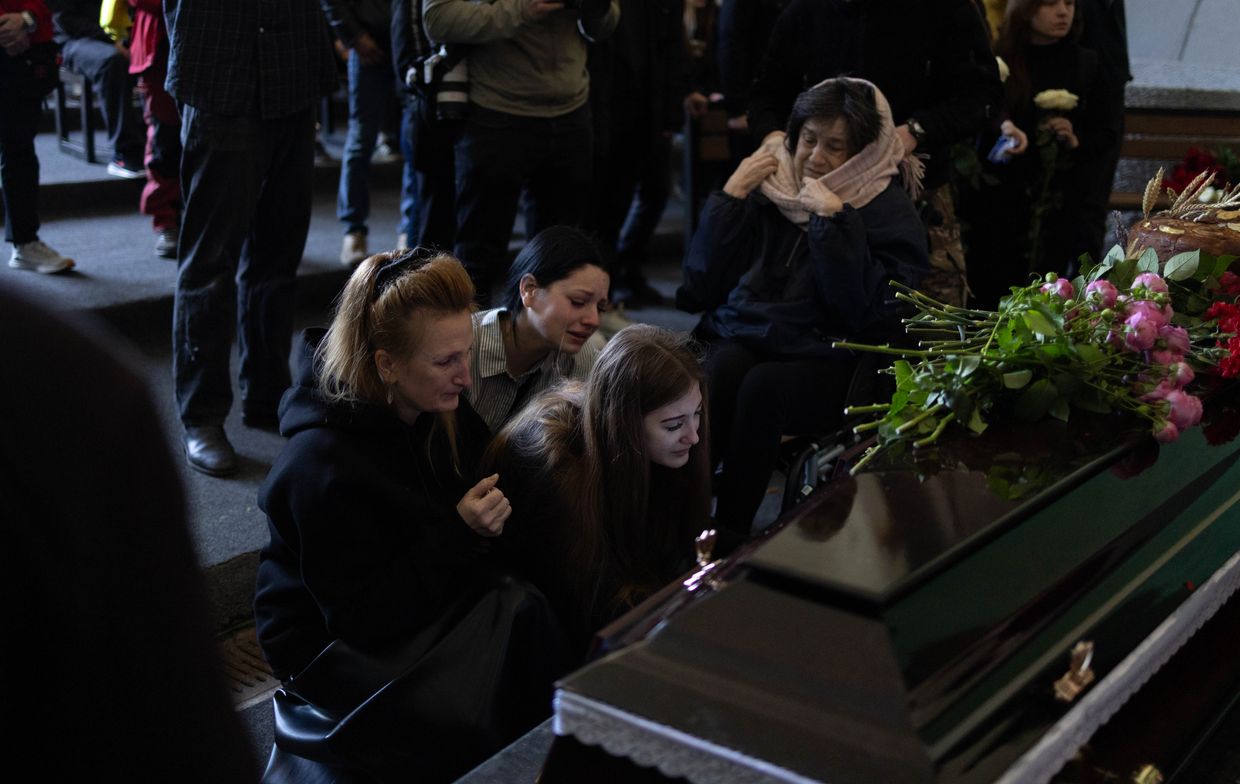
A girl cries over the loss of her boyfriend Danylo Khudia, 17, who was killed with his parents in a Russian missile attack on a residential area in Kyiv, Ukraine. (Anna Donets / The Kyiv Independent)
“Danylo was the brightest person I had known in my eighteen years,” said one young man during the ceremony. The death toll of the April 24 attack rose to 13, as a 45-year-old man died in the hospital, Kyiv City Military Administration head Tymur Tkachenko announced. The man, who suffered severe burns, is survived by his underage daughter and a six-year-old adopted grandson.
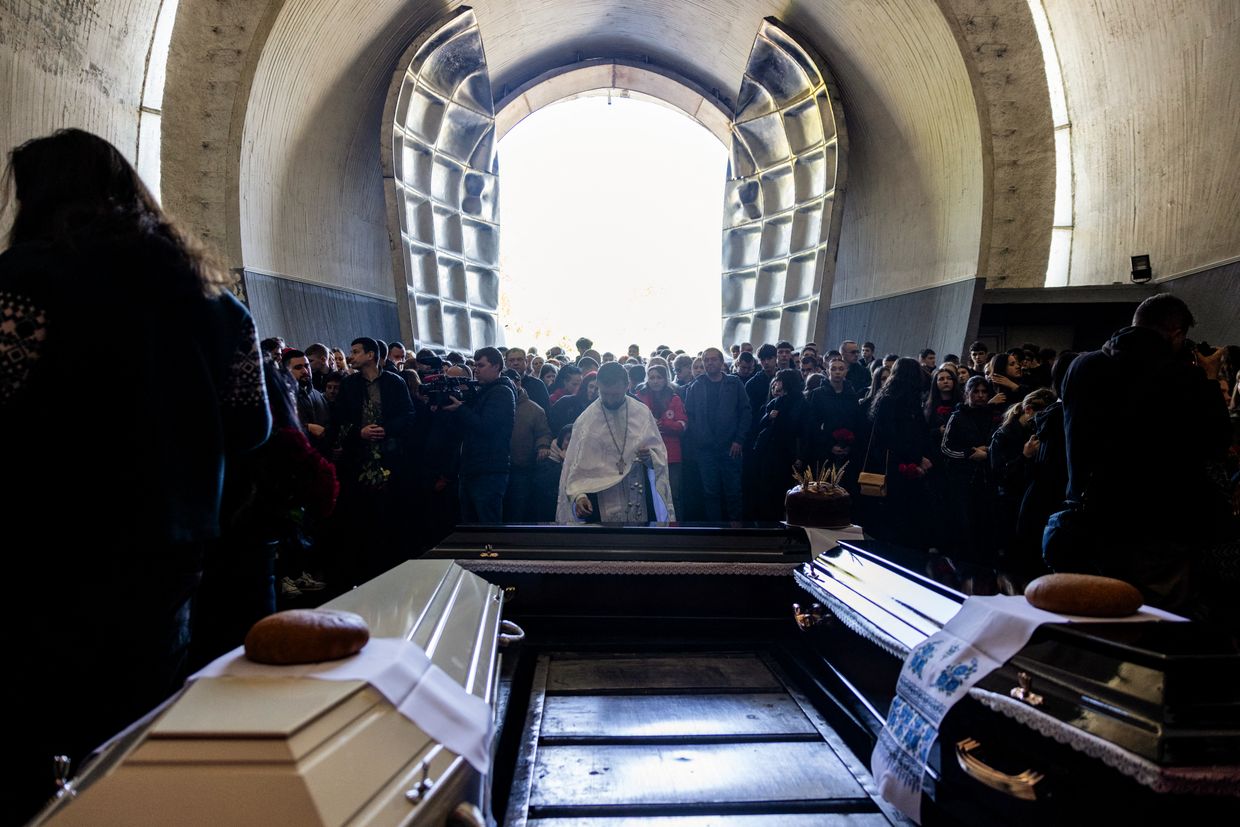
A priest reads the final rites during the family’s funeral in Kyiv, Ukraine. (Tetiana Dzhafarova / AFP via Getty Images)
The Justice Delivered: Former Ukrainian President Sentenced in Absentia
Ukraine’s former pro-Kremlin President Viktor Yanukovych has been sentenced in absentia to 15 years in prison for inciting desertion and organizing illegal border crossings, the Prosecutor General’s Office announced. This is Yanukovych’s second conviction by a Ukrainian court, following a 13-year sentence for high treason in 2019.
Prosecutors proved that on February 23, 2014, Yanukovych, in coordination with his former security chief and Russian representatives, organized an unlawful escape from Ukraine using three Russian military helicopters. The prosecutor revealed that Putin’s personal bodyguard, Sergei Morozov, and former commander of the Southern Military District Aleksander Galkin were involved in the illegal border crossing.
The Diplomatic Deadlock: Peace Process Stalls Over Territory Demands
U.S. Vice President JD Vance expressed frustration with both sides in an interview, but claimed the administration is “making progress” in negotiations, though he admitted he couldn’t say “with 100 percent certainty” that a deal would be reached.
“I think I’m saving that nation,” Trump said of Ukraine in an interview with the Atlantic. “I think that nation will be crushed very shortly… I think I’m doing a great service to Ukraine.”
Meanwhile, Russian Foreign Minister Sergey Lavrov reiterated Moscow’s longstanding demands in an interview with Brazilian news outlet O Globo. Lavrov insisted any peace deal must include international recognition of Russia’s control over Crimea and the entirety of Ukraine’s Donetsk, Luhansk, Zaporizhzhia, and Kherson oblasts. He also called for Ukraine to be barred from joining NATO, undergo demilitarization, and change its legislation regarding the Russian language and culture.
The Kremlin continues to blame Kyiv for stalling peace talks. When asked by journalists from whom Moscow is expecting a signal to further the peace talks, Kremlin spokesperson Dmitry Peskov said Kyiv, claiming Ukraine “currently has a legal ban on negotiations.”
